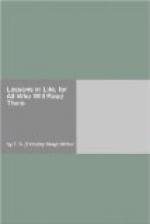An engagement took place in a few months after their acquaintance commenced. It was shortly afterwards that the conversation detailed in the opening of our story commenced, from which it will appear that Charles had not yet ventured to inform his mother of the choice he had made. Knowing the strength of her peculiar prejudices, he had every thing to fear, as far as opposition was concerned. The fact that Ellen appeared so anxious to obtain her favour made him less willing to risk the consequences of informing his mother that he had made his choice of a wife. He knew she would oppose a marriage most strenuously. What the effect of such opposition upon Ellen would be, it would be impossible to tell;—it might, he feared, lead her to decline his offer. For this reason, he urged an immediate union; and wished it to take place without his parent’s knowledge. Ellen opposed this earnestly, but was finally induced to yield. They were married, and started the next morning to visit Mrs. Linden. Two days before, Charles had written to inform his mother of what had taken place, and of his intended return home, on a short visit, with his bride.
“My dear mother,” a portion of his letter read, “I know you will be grieved, and, I fear, offended at what I have done; but wait only for a day or two, until you see my Ellen—your Ellen, let me say—and you will be grieved and angry no longer. She will love you as only an unselfish child can love a mother; and you will love her the moment you see her. I have talked to her from the first about you, and she has already so pure an affection for you, that she is longing to see you and throw herself upon your bosom. Oh! let me beg of you to receive her in the spirit with which she is coming to you. Be to her a mother, as she wishes to be to you a child.”
It was not without many misgivings at heart that Charles Linden set out to visit his mother. These could not be felt without their effects being perceived by Ellen, who was tremblingly anxious about her reception. Her spirits became in consequence depressed, and more than once Charles found tears stealing from beneath her half-closed eyelids. He understood well the cause, and strove, but vainly, to assure her that all would be as her heart could wish.
It was nearly nightfall when the carriage that conveyed them from the steamboat landing drew up before the elegant residence of Mrs. Linden. Charles hurried in with his bride in a tumult of anxiety. A servant was sent up to announce his arrival. Five minutes passed, and they still sat alone in the parlour—Charles deeply agitated, and Ellen looking pale and frightened.
“What can keep her so long?” the young man had just said, in a husky whisper, when the door opened and his mother entered with a slow, dignified step, her face calm, but severe, and her tall person drawn up to its full height. Charles started forward, but the instantly raised hand and forbidding aspect of his mother restrained him.




